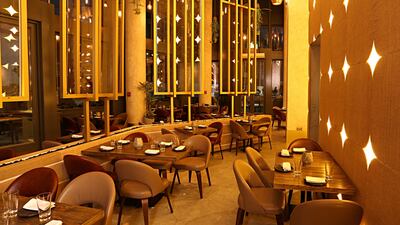Farzi Café is the brainchild of restaurateur Zorawar Kalra, the son of Jiggs Kalra, who is often referred to as the “tsar of Indian cuisine”.
Given this family connection, diners’ expectations are understandably high. The flagship restaurant is in New Delhi – and having eaten there, I was interested to see how its UAE offshoot measures up.
The Dubai establishment, in City Walk, aims to offer a modern take on Indian cuisine through the use of molecular gastronomy, although the menu also offers some non-Indian dishes.
It is a challenge getting a table at Farzi on a Saturday evening, given that City Walk has quickly built a reputation as one of the most popular dining locations in the emirate.
From the outside, the restaurant looks like a chic Parisian cafe. When we move inside and take our seats, I am impressed by the restaurant’s funky contemporary decor and high ceilings. It has a casual, easy vibe, fuss-free, comfortable seating, dark-wood tables, copper accents and a few punny food sayings on the walls, all of which help to give it a relaxed feel. Bulbs hanging by long wires from the ceiling add to the contemporary appearance.
The restaurant is packed when we visit, and we have to ask several times before we get a server. When he does finally appear, he is brusque and does not take the time to offer any recommendations.
We opt to start with handcrafted Wagyu sliders and the classic galouti burger. The two sliders have flash-seared meat slices, caramelised onion and Swiss cheese. The meat was soft and juicy, and paired well with the sweetness of the onions and the creamy cheese.
The burger is also served as two sliders and arrives at our table atop a toy lorry, accompanied by potato wedges.
Between the buns sit galouti kebabs (patties of spiced, minced lamb fried in ghee), chunks of roasted mutton and caramelised onions, in a bun slathered with green chutney. This is the more flavourful, spicy option of the two starters, with the tangy chutney complementing the spiced meat beautifully.
For mains, we chose the chicken tikka masala and the mutton pepper fry – two of the cafe’s most popular dishes.
I was looking forward to this course, but it turned out to be a bit of a let-down. Served in a stone bowl inside a small red telephone box, accompanied by a soft cheese naan, the chicken tikka lacks any obvious sign of the promised modern twist, or the showy presentation Farzi Café is famous for.
This is a dish that appears on Indian restaurant menus across the UAE – and the world – but I wasn’t sold on this version, which failed to distinguish itself.
The mutton, on the other hand, was delicious, with flavours of coconut, pepper and curry leaves really shining through. Disappointingly, though, it too lacked the promised, and expected, novelty factor.
The spiced, shredded meat was accompanied by a flaky South Indian-style paratha – offering nothing that is not available at a much-lower price from any hole-in-the-wall South Indian restaurant in the region.
Fortunately, our desserts go some way towards making up for these disappointments and are the best part of our meal.
Up until then the molecular gastronomy “wow factor” for which Farzi is known in India had been largely missing.
The jalebi caviar and risotto phirni oxide came highly recommended. The former seemed to be much like a “deconstructed” form of the beloved Indian spiral dessert, jalebi.
Farzi’s version features saffron foam, rabdi (a sweet dish made with condensed milk), nuts and tiny, crispy balls of fried batter. It is all beautifully presented and the three flavours combine with delicious results.
The phirni, however, steals the show. The chef prepares the dish at our table by combining the ingredients, including nuts, rice and cream, on a large platter, freezing them with liquid nitrogen.
It was a great way to end a night that was a little disappointing, given that I know what the Farzi experience is like in New Delhi – and the Dubai version falls far short of that.
Admittedly the restaurant in India offers a much larger menu, with more of a focus on Indian fusion fare, and offers a more showy molecular gastronomy component, which is in large part on show in its beverages – something that is missing in this country.
My advice when dining here in Dubai is to stick to the appetisers and desserts – and book in advance.
• Our meal for two at Farzi Café, City Walk Phase 2, Al Safa, Dubai, cost Dh325. To book, call 04 394 2556. Reviewed meals are paid for by The National and conducted incognito
ajhurani@thenational.ae


